#i have a hankering to get back into actually writing poems again. it was a part of my daily life as a teen
Explore tagged Tumblr posts
Text
they found a girl at the beach
her words all washed away
still feeling waves against her legs
and whale skin at her touch
foam in her hair, salt in her veins
so
they tell her about the sea
#poetry#haiz writes#REPOSTING because the format of a quote post made in 2013 just. breaks! fun#this poem is from over ten years ago i forgot i wrote it but it showed up when i looked for another post of course#the tumblr search function is broken in very interesting ways#the original was in norwegian and the translation needed some editing#but that's the beauty of it isn't it. a piece of art is never really truly finished. you can change it forever. and it will change without#i have a hankering to get back into actually writing poems again. it was a part of my daily life as a teen#but i dont... know how to get into that kind of space anymore. probably because it doesnt exist in the same shape#so i gotta carve it out again and it's hard!#also this is not what the poem is About but i can tell i wrote this after i watched Whale Rider (2002) for a school assignment
22 notes
·
View notes
Photo

The Theory of the Sicilian Origin of the Odyssey refers to a particular trend (particularly fashionable during the 19th century) according to which the true author of the Odyssey was a young woman from Trapani, who took inspiration from people and places familiar to her to write this famous epic poem. The postulation was made especially renowned after Victorian novelist Samuel Butler published his work The Authoress of the Odyssey in 1897 and is still debated nowadays. The main reasonings who could support the theory of a female writer are the fact that, in the Odyssey, women are depicted as more reasonable and positive than men, who act almost mechanically and aren’t as exalted as their female counterparts. While Iliad’s women are creatures who need to be protected, Odyssey’s women rule, counsel and protect. When Ulysses reaches Scheria, Nausicaa advises him to plead for help from Queen Arete rather than King Alcinous. No woman in the Odyssey is made fun of, and almost everyone of them is treated with respect, except if they committed a serious crime (like Penelope’s unfaithful handmaidens, who are showed no mercy) while men aren’t considered trustworthy and able. Also, the text is peppered with small errors (about navigation, the structure of a ship, the shape of a weapon etc) which no male author could have made.
Who, then, was she?
I cannot answer this question with the confidence that I have felt hitherto. So far I have been able to demonstrate the main points of my argument; on this, the most interesting question of all, I can offer nothing stronger than presumption.
We have to find a woman of Trapani, young, fearless, self-willed, and exceedingly jealous of the honour of her sex. She seems to have moved in the best society of her age and country, for we can imagine none more polished on the West coast of Sicily in Odyssean times than the one with which the writer shews herself familiar. She must have had leisure, or she could not have carried through so great a work. She puts up with men when they are necessary or illustrious, but she is never enthusiastic about them, and likes them best when she is laughing at them; but she is cordially interested in fair and famous women.
I think she should be looked for in the household of the person whom she is travestying under the name of King Alcinous. The care with which his pedigree and that of his wife Arēte is explained (vii. 54-77), and the warmth of affectionate admiration with which Arēte is always treated, have the same genuine flavour that has led scholars to see true history and personal interest in the pedigree of Æneas given in "Il." XX. 200-241. Moreover, she must be a sufficiently intimate member of the household to be able to laugh at its head as much as she chose. [...]
Lastly, she must be looked for in one to whom the girl described as Nausicaa was all in all. No one else is drawn with like livingness and enthusiasm, and no other episode is written with the same, or nearly the same, buoyancy of spirits and resiliency of pulse and movement, or brings the scene before us with anything approaching the same freshness, as that in which Nausicaa takes the family linen to, the washing cisterns. The whole of Book vi. can only have been written by one who was throwing herself into it heart and soul.
All the three last paragraphs are based on the supposition that the writer was drawing real people. That she was drawing a real place, lived at that place, and knew no other, does not admit of further question; we can pin the writer down here by reason of the closeness with which she has kept to natural features that remain much as they were when she portrayed them; but no traces of Alcinous’s house and garden, nor of the inmates of his household will be even looked for by any sane person; it is open, therefore, to an objector to contend that though the writer does indeed appear to have drawn permanent features from life, we have no evidence that she drew houses and gardens and men and women from anything but her own imagination.
[...]
Richly endowed with that highest kind of imagination which consists in wise selection and judicious application of materials derived from life, she fails, as she was sure to do, when cut off from a base of operation in her own surroundings. This appears most plainly in the three books which tell of the adventures of Ulysses after he has left Mt. Eryx and the Cyclopes. There is no local detail in the places described; nothing, in fact, but a general itinerary such as she could easily get from the mariners of her native town. With this she manages to rub along, helping herself out with fragments taken from nearer home, but there is no approach to such plausible invention as we find in Gulliver's Travels, Robinson Crusoe, or Pilgrim's Progress; and when she puts a description of the land of Hades into the mouth of Circe (x. 508–515)—which she is aware must be something unlike anything she had ever witnessed—she breaks down and gives as a scene which carries no conviction. Fortunately not much detail is necessary here; in Ithaca, however, a great deal is wanted, and feeling invention beyond her strength she does not even attempt it, but has recourse with the utmost frankness to places with which she is familiar.
Not only does she shirk invention as much as possible in respect of natural features, but she does so also as regards incident. She can vilipend her neighbours on Mt. Eryx as the people at Trapani continue doing to this day, for there is no love lost between the men of Trapani and those of Mte. S. Giuliano, as Eryx is now called. She knows Ustica: the wind comes thence, and she can make something out of that; then there is the other great Sican city of Cefalù—a point can be made here; but with the Lipari islands her material is running short. She has ten years to kill, for which, however, eight or eight-and-a-half may be made to pass. She cannot have killed more than three months before she lands her hero on Circe's island; here, then, in pity's name let him stay for at any rate twelve months—which he accordingly does.
She soon runs through her resources for the Sirens’ island, and Scylla and Charybdis; she knows that there is nothing to interest her on the East coast of Sicily below Taormina—for Syracuse (to which I will return) was still a small pre-Corinthian settlement, while on the South coast we have no reason to believe that there was any pre-Hellenic city. What, she asked herself, could she do but shut Ulysses up in the most lonely island she could think of—the one from which he would have the least chance of escaping—for the remainder of his term? She chose, therefore, the island which the modern Italian Government has chosen, for exactly the same reasons, as the one in which to confine those who cannot be left at large—the island of Pantellaria; but she was not going to burden Calypso for seven long years with all Ulysses’ men, so his ship had better be wrecked.
This way out of the difficulty does not indicate a writer of fecund or mature invention. She knew the existence of Sardinia, for Ulysses smiles a grim Sardinian smile (xx. 302). Why not send him there, and describe it with details taken not from the North side of Trapani but from the South? Or she need not have given details at all—she might have sent him very long journeys extending over ever so many years in half a page. If she had been of an inventive turn there were abundant means of keeping him occupied without having recourse to the cheap and undignified expedient of shutting him up first for a year in one island, and then for seven in another. Having made herself so noble a peg on which to hang more travel and adventure, she would have hung more upon it, had either strength or inclination pointed in that direction. It is one of the commonplaces of Homeric scholars to speak of the voyages of Ulysses as "a story of adventurous travel." So in a way they are, but one can see all through that the writer is trying to reduce the adventurous travel to a minimum.
See how hard put to it she is when she is away from her own actual surroundings. She does not repeat her incidents so long as she is at home, for she has plenty of material to draw from; when she is away from home, do what she may, she cannot realise things so easily, and has a tendency to fall back on something she has already done. Thus, at Pylos, she repeats the miraculous flight of Minerva (iii. 372) which she had used i. 320. On reaching the land of the Læstrygonians Ulysses climbs a high rock to reconnoitre, and sees no sign of inhabitants save only smoke rising from the ground—at the very next place he comes to he again climbs a high rock to reconnoitre, and apparently sees no sign of inhabitants but only the smoke of Circe's house rising from the middle of a wood. He is conducted to the house of Alcinous by a girl who had come out of the town to fetch a pitcher of water (vii. 20); this is repeated (x. 105) when Ulysses’ men are conducted to the house of the Læstrygonian Antiphates, by a girl who had come out of the town to fetch a pitcher of water. The writer has invented a sleep to ruin Ulysses just as he was well in sight of Ithaca (x. 31, &c.). This is not good invention, for such a moment is the very last in which Ulysses would be likely to feel sleepy—but the effort of inventing something else to ruin him when his men are hankering after the cattle of the Sun is quite too much for her, and she repeats (xii. 338) the sleep which had proved so effectual already. So, as I have said above, she repeats the darkness on each occasion when Ulysses seems likely to stumble upon Trapani. Calypso, having been invented once, must do duty again as Circe—or vice versâ, for Book x. was probably written before Book v.
Such frequent examples of what I can only call consecutive octaves indicate a writer to whom invention does not come easily, and who is not likely to have recourse to it more than she can help. Having shown this as regards both places and incidents, it only remains to point out that the writer's dislike of invention extends to the invention of people as well as places. The principal characters in the "Odyssey" are all of them Scherian. Nestor, Ulysses, Menelaus and Alcinous are every one of them the same person playing other parts, and the greater zest with which Alcinous is drawn suggests, as I have said in an earlier Chapter, that the original from whom they are all taken was better known to the writer in the part of Alcinous than in that of any of the other three. Penelope, Helen, and Arēte are only one person, and I always suspect Penelope to be truer to the original than either of the other two. Idothea and Ino are both of them Nausicaa; so also are Circe and Calypso, only made up a little older, and doing as the writer thinks Nausicaa would do if she were a goddess and had an establishment of her own. I am more doubtful about these last two, for they both seem somewhat more free from that man-hatred which Nausicaa hardly attempts to conceal. Still, Nausicaa contemplates marrying as soon as she can find the right person, and, as we have seen, neither Circe nor Calypso had a single man-servant of their own, while Circe was in the habit of turning all men who came near her into pigs or wild beasts. Calypso, moreover, is only made a little angry by being compelled to send Ulysses away. She does not seem to have been broken-hearted about it. Neither of them, therefore, must be held to be more fond of men than the convenience of the poem dictated. Even the common people of Ithaca are Scherians, and make exactly the same fault-finding ill-natured remarks about Penelope (xxiii. 149-151) as the Phæacians did about Nausicaa in Book vi. 273-288.
If, then, we observe that where the writer's invention is more laboured she is describing places foreign to her own neighbourhood, while when she carries conviction she is at or near her own home, the presumption becomes very strong that the more spontaneous scenes are not so much invention as a rendering of the writer's environment, to which it is plain that she is passionately attached, however much she may sometimes gird at it. I, therefore, dismiss the supposition of my supposed objector that the writer was not drawing Alcinous’ household and garden from life, and am confirmed in this opinion by remembering that the house of Ulysses corresponds perfectly with that of Alcinous—even to the number of the women servants kept in each establishment.
Being limited to a young woman who was an intimate member of Alcinous’ household, we have only to choose between some dependant who idolised Nausicaa and wished to celebrate her with all her surroundings, or Nausicaa (whatever her real name may have been) herself.
[...]
The fact that in the washing day episode, so far as possible, we find Nausicaa, all Nausicaa, and nothing but Nausicaa, among the female dramatis person, indicates that she was herself the young woman of Trapani, a member of the household of King Alcinous, whom we have got to find, and that she was giving herself the little niche in her work which a girl who was writing such a work was sure to give herself.
[...]
At the same time I think it highly probable that the writer of the "Odyssey" was both short and plain, and was laughing at herself, and intending to make her audience laugh also, by describing herself as tall and beautiful. She may have been either plain or beautiful without its affecting the argument.
I wish I could find some one who would give me any serious reason why Nausicaa should not have written the "Odyssey." For the last five years I have pestered every scholar with whom I have been able to scrape acquaintance, by asking him to explain why the "Odyssey" should not have been written by a young woman.
Samuel Butler, The Authoress of the Odyssey
#historical women#women#history#historicwomendaily#women in history#the authoress of the odyssey#samuel butler#Greek Sicily#trapani#Province of Trapani#people of sicily#women of sicily#historyedit#myedit
27 notes
·
View notes
Text
(REVIEW) Not your minute turns from the blueprint: Body Work, by Tom Betteridge (SAD Press, 2018)

Denise Bonetti <[email protected]> Mon, 10 Dec 2018, 20:21 to maria.spamzine Hey Maria, Hope life’s good :) I’m just writing to see you if you’ve read Tom B’s new Body Work? There’s a paper I should be writing, but have been reading and rereading that pamphlet instead, or more like dipping in and out really, cause it's so beautifully layered and expanding that you can only take so much at a time. Don’t you think Tom’s poetry has this strange earworm quality to it? (I think he’d like the annelid comparison.) The way he choreographs words (I don’t want to use the word 'images’) makes its way into my brain and never wants to leave. He draws these, like, lateral paths of meaning so clearly that the weeds never grow back.Tom Raworth has this bit in 'Writers / Riders / Rioters' that goes:
the present is surrounded with the ringing of ings which words have moss on the northside
like, words naturally arrange themselves into a system of semantic habit, which is so stable and stale that makes them grow moss, but also so rich and vibrant when it's exploited productively. Obviously this is Raworth so it probably also means the opposite of this and so much more, but it kinda makes me want to say that the present (poem) makes the ringing of ings deviate so well that the moss can never grow again. I’d say that his poems behave like sophisticated lines in the sand, but they're more like brutal carvings on a rock. He had a couple poems in Blackbox Manifold ages ago (I think) and there was this one bit
‘nerve truffled plume lead pickled breast’
I think about all the time (especially when I cook). It’s so smooth. Why can I not stop thinking about it. It’s cause it’s so shameless, it wants it all - the feather-light and the corpse-heavy, never perturbed, so lucid. It plays at tasting good, but it tastes of an unrealistically blank texture. A-ha! Anyway the new pamphlet is gr8, if you haven’t read it yet look at the first poem pls - ‘OCCAM OCEAN’ (sounds like an anagram or palindrome)

It all dwells in systematic abstraction but flies so close to materiality, like a mosquito buzzing around the ear ('Not your minute turns from the blueprint'). I love that ‘plate’ in the first phrase, too: it behaves like an adjective but feels nothing like it. I can't help but think it's the subject of the sentence in a parallel universe that's created by scrambling syntax. It makes me think this is the way language should always work, and that we're the fkn idiots living in the parallel universe in which syntax is scrambled in ordered to be as boring as possible. Idk - it's late and I need to go back to writing boring essay syntax 'bound to decision and the pursuit of what follows'. Lemme know ur thoughts you smart queen D xxx
Maria Sledmere <[email protected]> Wed, 12 Dec 2018, 17:30 to denise.spamzine
Dearest Denise,
Life is good thanks. I'm sitting in the attic of the law building and I can hear the construction work going on and every time I leave I look out at the skyline and slivers of infrastructural alteration. I was walking along the road earlier because the pavement was closed off for construction and cba crossing and the high-vis guy was like, 'you'll not see Christmas walking on the road like that', but I guess I misheard him saying something else because I was really engrossed in this old Slowdive album, so I just smiled sweetly. Anyway, that got me thinking back to the question of erasure, which I think is pretty vital to Body Work.Have been carrying this pamphlet in my bag for so long that the cover has started to peel and revealing speckles of white underneath, like the text itself is ready to reveal itself, and yes I was thinking Barthes and strip-tease and paratextual enticement.
So I had to google the word annelid and now can't get the phrase 'segmented worm' out of my ear/head/throat (gross!). I was thinking about what sort of stains are on the cover of this book, you know, with Hrafnhildur Halldórsdóttir's gouache/pencil work. A stain is one thing stuck to another. Gouache is a funny kinda substance that is half watery gauze, half binding, thick, gummy akin to acrylic. Wet, it will easily smudge. My thumb keeps bleeding where the skin thins, hardens, peels and sloughs off. Tom's poems are kinda mucilaginous in parts (v. insecty, molluscky, sap emission; but also they have a crispness and precision, like cuts of leaf). Things that smudge or fall in flakes. Bodies are maybe whatever we leave behind. I didn't want to mention Hookworms the band because of the singer's sexual abuse scandal BUT it seems significant that a group named after an earworm/type of parasitic larvae would have a song called 'Negative Space'. Like what we eat into in the process of making, existing, remixing. Is language a rash, the result of these parasitic inf(l)ections?
I've been to a couple of reading groups on microbiomes lately, and we were thinking through this idea of how acknowledging your bodily composition in terms of myriad genes and organisms challenges conventional, bounded notions of 'self'. What kinds of affects does this produce? There's a weirdness to that, in Mark Fisher's sense of the weird as 'that which does not belong', that which 'brings to the familiar something which ordinarily lies beyond it, and which cannot be reconciled with the "homely" (even as its negation)'. Fisher suggests that the form most conducive to rendering the weird might be montage. So I was thinking about how montage involves splicings, gaps, juxtapositions, cuts and suddenness. I mean you open the very first poem of Body Work, 'Occam Ocean', and see that its prose-poetic paragraph compacting is split in the middle by the juncture of line break and indent. And ofc the title recalling Occam's razor, the philosophic principle by which in the case of two explanations for an occurrence, it's best to go with the one that requires least speculation. Razor things down and erase speculation? What are we left with, more of the Rreal? Lately I've been hankering for cleaner prose, crisp lines, simpler solutions. The Anthropocene is all of a goddamn tangle. Do I want to follow the myriad threads or just cut cut cut -- who gets to do that?
Did you ever cut a worm in two as a kid?
Okay so I love how 'Occam Ocean' might promise, title-wise, this clean prosaic expanse (like the oxymoron of expanding ocean and occam's, which requires surely a condensing), but what we get is clustering, motion, shiver, containment. The sensual trash magickk of P. Manson! The little syncope of this thing or that, the 'maple neck', vibrating canes, 'chambered breath bowed into the driest soundboard'. These aren't like 'Latour litanies' because they are not like concrete OOO segments of things; idk, they are more about processes and mutable assemblages, emphasis on action and change, sometimes transmission, things inside things. Lynn Margulis and symbiogenesis. How things interact, communicate up close; all of a mutable, prose-poetic swallow. It's actually an incredible intimate pamphlet, don't you think? I feel inside a thing inside a thing inside a thing. I feel a vague ecological sorrow, which gnaws at introspective tendency. The clue to that, you might see, is the cutaway phrase, 'emo Chord' in 'String Growth'.
'Collapse all tears allowing echo retreat'; these lyric lines of 'Glissando' expression, smoothing and shimmering over cuts and junctures: a slide between notes. I used to play trombone and I wish I cld articulate linguistically what kinds of lip vibration occur when you attempt a glissando and feel it slide down your arm muscle but then also through your chest as you try to sustain a sound. It's maybe the way you glide through a scattered poem, with your eye, which is different ofc to the spikier way you'd have to read it aloud, stuck on the vowels. Stuttering. I would love to hear Nat Raha perform these poems, because she does such wonderful things with punctuation and bodily performance, a kind of grammar of breath and cough and click. Reading over the more field erasure poems like 'O--NE' and 'String Growth', it's easy to say something like ~vibrant materialism~ here, but as usual I reach for Steven Connor on noise. Return to the ear, which is 'vulnerable' and 'resembles the skin in being the organ of exposure and reception'. I love what Connor says about Levinas' perspective on 'the awareness of the vacant anonymity of being, of an abstract, encompassing sense that "there is"' being 'an experience of noise'. <3 Acknowledging that breath in the void, that is not nothing but a sparkling something, entails a sense of noise. I am here in the attic of the law building, listening to construction, the type of my fingers on the keys. Someone is murmuring of their distress. What is the difference between living and existing, and being and nothing?
Karen Barad:
'Suppose we had a finely tuned, ultrasensitive instrument that we could use to zoom in on and tune in to the nuances and subtleties of nothingness. But what would it mean to zoom in on nothingness, to look and listen with ever-increasing sensitivity and acuity, to move to finer and finer scales of detail of...?'
When she asks, 'What is the measure of nothingness?' I think surely it is a bodily measure, as everything is: 'bound', as Tom puts it, 'to decision and the pursuit of what follows'. Of course 'what follows' recalls Derrida's 'The Animal That Therefore I Am (More to Follow)', where he's just out the shower and watching his cat watching his phallus, etc. What kinds of dislocation occur. But I mean in all that grandeur of encounter, there's still anthropocentricism. Tom gives you this cinematic CUT, like the instructive 'keen SNAP' that occurs in 'Occam Ocean' to dramatise 'Still, pondsnails whir and blindly source [...] a working leaf shutter'. Soever the language enacts the slurs of the snails up close. We look for the answer to the question of ellipsis, the more to follow [what follows]: inevitable, a question. Sometimes Tom is writing about silence ('then silence confronts an earful underhand') but the music of his language does all the noise, so we just can't have nothingness: there is always a vibrational residue that speaks of something in miniature, atomic, happening.
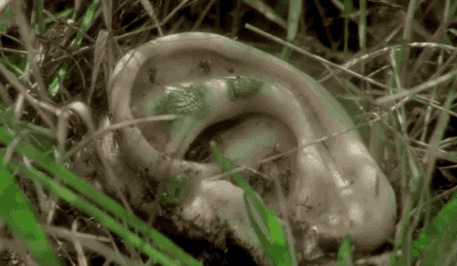
Ofc with the ear again I am thinking of the ear at the start of Lynch's Blue Velvet and how it's covered in rasping wee insects whose hum is a sort of white noise of trauma that runs through Lumberton's suburban idyllicism.
And so what happens next is I flip open to the following page of Body Work and there is 'String Growth', one of Tom's sprawling erasure poems, which for more than a split-second resembles hundreds of crawling, shimmering ants. I actually think my earliest childhood memory is of looking down at my bare feet on the patio of our old house in Hertfordshire and seeing red ants run over my toes. Then looking up to a greying, English sky. Constantly struck by the cinematic image of that, its splicing out of time: the vividness of insects on human flesh, then milky smog of skyward nothingness. 'String Growth', the accompanying notes to Body Work tell me, is an erasure poem of the Chordoma Foundation's 'Understanding Chordoma' information page.
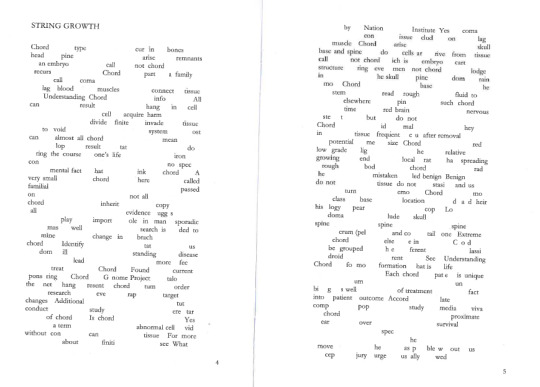
Erasure can expose sequences of nightmare at work in the lexis and syntax of the text on which it parasitically feeds. I am scared to go on the Chordoma Foundation's website, for fear that just reading or saying the word 'tumour' will activate some kind of malignant growth in my body. And so something of the word chord as a sonorous relation between materials (bodily, textual; textural, cellular). Chordomas are tumours often located in the spine and so I find myself looking for the undulating shape of a spine in the scatter-text of Tom's poem. My eyes cascade down textual spines. Why is it sometimes I otherwise latch upon a 'keystone' word which then extends with adjacent resonance? Musical abnormalities accumulate. Thought swells.
And yea I wonder how this fits into what you say about the poems being 'so smooth'. Like Lynch's waxen silicone ear. Because even though fragmentation makes me think of bits and jaggedness etc, there's this sheen of aestheticism to Tom's work that makes me think of gloopiness, fullness, thereness but also the glaze of potential nothingness. Like in Barad's sense, or miniaturised ecological window shopping - a la Morton's Romantic consumerism? Or do we get into the things themselves? What are your thoughts on the question of recalcitrance? Maybe cos he named a previous pamphlet Pedicure I've just got varnish on my mind. Things an insect might stick to, and be amberized in. Mm.
'[...] Phosphorus crystals may be white, red, burgundyor alight as urine passes'
I keep a stone of citrine under my pillow sometimes. It is supposed to alleviate nightmares and 'manifest abundance'. It is the colour of a rich, dehydrated piss and sometimes when I come back to bed after peeing in the night I think it's some kind of organ lain on my bedsheets, hopped out of my body, and I have to stop my heart and breathe. Is that syncope?
On the <topic of piss>, isn't there a sort of caustic quality, even to the smoothness? Like it is working at making a brittleness of its sheen? And that is what poetry is, cracking the veneer of language or something? Punctuational insects dwelling in splits and fissures? It is nice and cool in Tom's poetry, a place for thinning the self and dwelling. Even though the lexis is so rich and dense, it still seems slender somehow; there's a suppleness. Tease threads of your silk(worm).
Was thinking about what Lisa Robertson says about 'commodiousness' in poetry and what kinds of space there are for the reader here, because I don't think there is much space at all, in the conventional humanly readerly sense. Maybe what I mean by (straw man: Romantic) lyric, which requires something of declarative expansiveness? The density and clutter of specialist language in Body Work makes me feel like a worm, trying to hook my way lusciously into a line: 'espalier's / strains unfinished by the scarp trellis' ('Body Work'), 'rooted to a middle-ground / no more than motion defibrillates'. And I become a parasite on the body of the text, which is a parasite on the body, which is made up of millions of (para)sites. Para ofc meaning side by side, which made me think of Haraway's sympoeisis (making-with) but also, admittedly, Limmy's madeup psychic show, Paraside (lalalol what you were saying about the scrambling parallel universe maybe, is that a lalaLacian Real which necessitates ululation, stammering? Complex remixing musicality of language throughout Body Work as summoning?). Going back to my incidental Slowdive reference earlier, maybe there's a shoegaze thing here, like setting up these 'noise-worlds' which shimmer indiscriminately behind/inside/through the semiotic oscillations of lyric? Is shoegaze a form of sonic gouache? Well it is certainly an ontic form of seduction, where I can't pick out the instruments of expression but I look for them hungrily in the haze. And the idea that transmission between worlds (the living/dead, human/nonhuman) might require a strain of humour (like haha but also meant in the sense of bodily humours?). For instance, shoegaze is decidedly not a humorous genre, but it sort of works on bodily humours, sometimes giving me the bends, or the blurry spaced-out feeling of having one's pleasure receptor's caressed by sound. Was wondering how YOU experienced the space and physicality of the poems -- was there anything u found FUNNY or sufficiently sultry as to produce a long and gorgeous sigh?
Mm and aren't there these tasty, cute moments of wow like 'tropic glut' ('O--NE') and 'prism arousal' ('Body Work') and 'clamour to emboss' ('Sapling').
Come to think of it, there are quite a lot of trees in Body Work, at the very least between 'Sapling' and 'Copsing', but also resonance in 'Awning', 'Annual' (which mentions 'yield', 'Thicket', 'sky-light muddle' etc) and 'Georgel' (georgics, idk?). Something about sprawl and thread: like the action of branches as arboreal mirror for threads of viruses, threads of code?
Side note: Can a person in a crowd of people experience canopy-shyness? Emily Berry has this lovely poem about crying and canopies and language.
Ways to dwell in inertia, violence, suspense ('Poem for July') as a 'clearing' within the pamphlet? Body Work as a title seems to combine two distinct fields: car repair and alternative medicine (hence mention of plants, cancers and crystals). The question of holistic approach, therapeutics, restoration. The sheen of metal, the sheen of health. O wise one of la letteratura del contemporaneo, pray tell your thoughts on possible Ballardian comparisons? Like obv v. different but I was struck by something to do with the cut-up structures of The Atrocity Exhibition and the way erasure works in Tom's work (probably in a more precise, attentive way, like the specialist's collage of tiny skins and digits, as opposed to grander themes of mediation that explode all over Ballard's work? -- generalising for the sake of interest obv).
Longing for a 'carvery [of] / uncommoning / rave'. Some kind of party you'd give up your skin for (is skin mere synecdoche of identity here?). Maybe the rave is what you were saying about scrambling.
Anyway, I hope your essay is going well. I must go read Hillis Miller's thoughts on Ariadne's thread, maybe make a tea. I've been getting these headaches lately, dawn to dusk & beyond, like the kind you get after being swimming (chlorine headache) or after crying (hormone headache). Pressurisation. I wonder if I have a parasite in my brain? So tonite I will probs lie awake, sleepless, listening for tinnitus :(
With warmth, Maria xxxxxxx
p.s.
Of course, by the time I get to the end of rereading I realise that it's only white marks being revealed underneath because literal holes have appeared in the Body Work cover, like some kind of fungus has been eating away at the book, performing another erasure.
Denise Bonetti <[email protected]> Fri, 1 Feb, 12:15 to maria.spamzine Dear Maria, Once again my legendary inability to reply to personal emails within a reasonable 1-month window manifests itself. Invoke my Scorpio moon (?) etc. I love it when people are like 'RIGHT - enough Facebook for me, email me if you want to talk etc', because that sounds like a nightmare to me. Long live IM! Long live the short form! (quite rich coming from someone whose job at the moment, I guess, is to churn out a dissertation?)
But then you know what I was thinking - someone like Clark Coolidge, for example, can get away with long form, intense long form. Not only get away, but own that long form. That long form I'm into. Clark Coolidge drown me in words and I'm fine with it, because he never dilutes, there's never any stagnation, you know what I mean, he just goes and goes and goes and you're like !!? YES!! HOW ARE YOU DOING THIS!? He just never runs out of steam. And I'm thinking of Coolidge because you mentioned crystals as agents in Tom B. (cf. The Crystal Text, how would the crystal speak etc), and of course because both Tom B. and Clark C. are just doing mad things with language, bold things and exciting things... They are like scientists you're friends with but who (maybe) don't like to talk about their work, then one day they decide to let into their basement lab where they've been secretly working on the most complex, organic, project for years, and they're like, don't freak out, here it is:
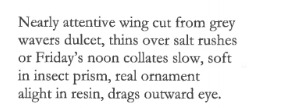
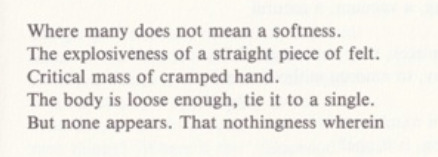
(Sorry for terrible quality [#postinternet] First is Tom B., second is Clark C.) Body Work looks quite controlled in form, visually speaking, with its vaguely justified lines, BIG symmetrical margins.. even the scattered pages look orderly! Like the bit of 'STRING WORTH' you sent. Which going back to your erasure thing, it makes me feel like Tom B. is giving us an OXO cube of his writing, all concentrated and delicious. But then my response is - show us more!!! Which rarely happens because I am scared of long form. And email. And dissertations. I also LOVE what you said about how Body Work combines car repair and alternative medicine!! That is absolutely spot on. Like the material, pragmatic tinkering motions of his writing, the referral to structures and the intention of like, see how far we can bend them and push them, but then it is never as dry as that! Very sweet motor oil. It's very kind poetry... generous! (A word that my friend Phoebe used to describe a certain type of poetry at a party last week and I thought, very interesting). Linguistically generous because it offers so many networks of reading, but then also.. approachable? As approachable as experimental poetry of this kind can be. I'm sure like, DANIEL would not think this is approachable lol (#COYBIG #romance). Which, fair enough. But if you're a nerd for this kind of poetry, then yeah. Like this bit from 'ANNUAL'??

*Cries!!! This is like you said, healing!! I feel looked after! 'Stomach prefers sound to day-to-day camphor'!!! Honestly what is this! So touching, so simple!
(Btw, I started experimenting with aromatherapy in my tiny room lol, do you know how to stop the water from boiling in the oil burner??)
Thanks for sending such interesting ideas over, I have to shoot to a seminar ! PPS: I saw Steven Connor in the English library yesterday (Oliver pointed at him silently like !!!!!!!!!!) so I kind of followed him to see what his approach to book browsing is.. very natural-looking and orderly? Surprised. Love the guy. *bubble sounds*
Lots of love Maria ‘let’s see where the spirits take us’ ur the best
xxxxxxxxxxxxxxxxxxxxxxxxxxxxxxx
Maria Sledmere <[email protected]> 6 Feb 2019, 23:19 to denise.spamzine Dear Denise,
Makes so much sense to map your message sensibilities onto your taste in poetry! I am so torn between the percolated richness of the email, its classic deferral (omg hun I owe you a million emails!) through a sort of quantum dimension of procrastination, and in opposition the sugar rush nowness of IM. I am such a frantic typist that often I send the wrong messages or cross my wires or just gush too much, so email is probably a safe option for me. There is all too much blue in my Messenger windows...Temptation of x's and endless emojis. But such a beauty to IM and texts out of context, like I wonder how many people read your probs too late 4 a snog now :'((( as micro-fictions, versus poems. I have a whole folder of screenshots on my computer from things that happened on Facebook that I have no memory of. Something about the Romantic fragment, accumulating ruin.

(btw) I feel like these extracts also shed light upon Body Work somehow. Biodegradables versus hard minerals and synthetic matter. Inner/outer. Flush. Tbh I think the middle one was from you?

Yes the dissertation, the dissertation as labour; it's like you have to find your scaffold first. Sometimes I feel like the scaffold in that wonderful Sophie Collins poem, 'Healers', and I write and don't notice myself and suddenly I'm so there, but the scaffold is secretly taking her bolt pins out the more I write around her. You can only be so respectful to your scaffold when she's so in the way. Gemini problems?Duality; structure/content. What is it Tom McCarthy says: 'structure is content, geometry is everything'. I want to be a wee fractal in a sequence of massive refraction. Is that how it works? Back to scaffolds, maybe we need to find the kindest mode of dismantling, and that's when you work into a form or something. And then also the more organic structures! So for CC it's the whole crystal thing, and working out of crystal logic. And then you just go and go and it's wonderful, much extravagant fractality, almost like poetry as virus, replicate replicate, grow, change. Mm, it's so good. My friend Kirsty did this mad poem about a tree, I couldn't tell if it was a story or poem, it was just branching out in a way that seemed hungry, necessary, spreading its roots. She said she wrote it in a rush! As if trees could rush! I like to think she inhabited a concentrated moment of becoming-tree, like she was a myriad in the roots or leaves. I don't think it could have happened without the tree, you know? But also the tree was almost entirely absent, it was like a ghost of form. Maybe I forgot how it goes. The lines looked like branches or something. Can you have long-form concrete? Concrete I guess by necessity is long-form. It takes a lot of energy to make. People are building houses out of mycelium instead, which is rad. Talking of roots and that, I just wrote 26k words on ecopoetics & t h r e a d s over the past fortnight and it was kind of that process, like letting a sort of tapestry take hold and I was maybe just one more thread, I was hardly doing the weaving, everything was moving around me and I wanted to wriggle into more and more gaps. Becoming-thread, perhaps. The next step is to slack and cut, which is exciting. Where to even start?
Your description of the complex, organic project is so gorgeous. Poems slow-cooked in a lab with tender organic care. My two scientist PhD pals are always gramming these beautiful pictures of crystals they're growing or mad wave patterns on screens. And we go for lunch and I'm like what you doing this afternoon and they're like, Oh just shooting photons. And is that much different from spending your afternoon writing poems? (Yes, they'd groan). I'm just chasing bits of light. Reading Tom B's work it's this whole precision thing, the actual inhabitation of process as such, so you see the energy buzz between things. I don't mean to say simply this is atomic poetry or poetry as tool analysis. It's more a betweening.
Isn't it super difficult to write non-anthropocentrically and really inhabit micro-relationality and also sound interesting and sexy in the way Claire Colebrook (she has that great essay in Tom Cohen's Telemorphosis) describes as 'sexual indifference', i.e. that threat to heteronormative reproduction that 'has always been warded off precisely because it opens the human organism to mutation, production, lines of descent and annihilation beyond that of its own intentionality'? Well anyway Body Work really works this way for me, it's like a poetics of sexual indifference that is nevertheless charged with desire you can't really predict, it's something in the frisson between objects and lines and coils of form. I think of crystal charge, iPhone battery (mine's always dying, Gemini trait 100%), engines. Neat miniaturisations of entropy, surge, spike and flux. When the 'I' comes in I'm like hey, what flow are you? It's actually so satisfying to quote these poems as fragments btw, they can do so much on their own as much as in poems and pamphlets, I wonder if that goes back to the accessibility thing. Like the absolute charm of a line as auto-affection:
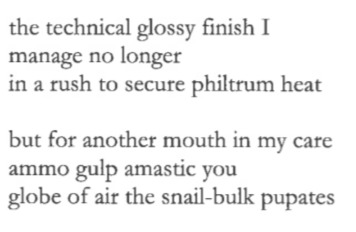
This bit is from 'Temper' and I go back to my point about the flush/fluster! Globe of air/your *bubble sounds*. Isn't everything held so neatly, and yet it never feels neat, it just feels sharp and sparking, this 'technical glossy finish' like a really nice car, the body paint of a poem, its prosody so tightly held it feels more surface, a selection of hues and textures. And the erotics of the text or at the very least its pleasure is the shift between bodies, synecdoche, yes you could say bodies without organs but things in themselves are also important. Maybe another poet who does this is Sylvia Legris, she writes these apparently impersonal poems filled to the seams with specialist lexis (you have to have like twelve tabs open per poem to get it), but there's an affirmative humour and energy that feels v much a personal sensibility, a deliberated skewing of world that splices the poet's agency among items, artefacts, language. I mean how nice are these poemsshe published in Granta. I feel like I want cutlery to read them with, if that makes sense. Maybe a scalpel, for the succulence. The appearance of an ear again!
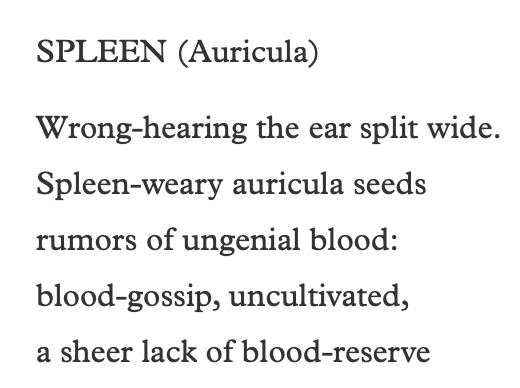
And then the beautiful metallurgy of this line from Tom, like somebody pierced my ears with perfect silver and it let all the demons out:
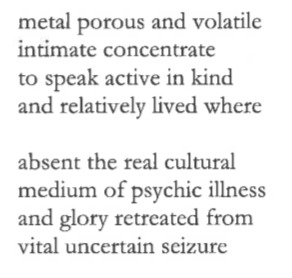
I am worried about what a certain seizure would look like. When we talk about vitality is it a willing naivety towards matter qua matter, as if we could just step out of correlationism? Such thoughts for 11pm of a Wednesday night. I can't help but think of the body image that Elizabeth Grosz describes in Volatile Bodies, kind of riffing off Paul Schilder: 'What psychoanalytic theory makes clear is that the body is literally written on, inscribed, by desire and signification, at the anatomical, physiological, and neurological levels'. And yeah, cool, what about the nonhuman body also? Has anyone done a really good psychoanalysis of the object. Parsed its psychic striations (traumatic or pleasurable residues of every microbial, huh?). In fact, what about the psychodynamic model of actual icebergs? Time we started literalising the matter of metaphors, absenting 'real cultural / medium' and filling with meltwater, fire and flow. Maybe it comes down to a bead of ink, the 'intimate concentrate' which is Lucozade, hangover piss, sick pH levels. So yeah, Body Work for me is this totally seductiveintersubjective space which actually works out pretty visceral states, sometimes disembodying me into a more fractal, mineral or bacterial being. I could start talking Kathryn Yusoff and geomorphism too, but maybe enough strata for one email? Plus I'm mixing my metaphors, I'm sure, mostly because I'm still morphing, dissolving inside those lines. I think I ate too many OXO cubes.
As for your oil burner boiling, sounds like you have an overactive candle? Maybe try a cooler tealight, nestle it to the back a little to redirect the strength of the flame? I like rosemary oil for remembrance, cranberry for comfort, ginger for energy. That line about resin is so nice. I was in Crianlarich at the weekend and my friend Patrick found this massive log and he carried it for so long that you could smell the resin on his skin, it was amazing. I keep thinking about the word 'pitch' and lush tree-ness, and the Log Lady in Twin Peaks and poetry you can chew like new molasses, prior to melt. Is that how it works?
Somebody is smashing glass into a bin in my garden and probably I should just close the pamphlet...
...but it's like a delicious pdf that gives infinities...
Yours in multiples & cherryish flusters,
Maria xoxoxoxooxoxoxoxoxooxoxoxox
1 note
·
View note